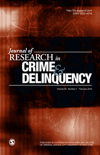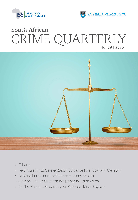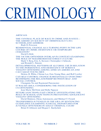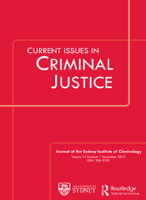
JOURNAL OF RESEARCH IN CRIME AND DELINQUENCY
Scope & Guideline
Unveiling insights into criminal behavior and social dynamics.
Introduction
Aims and Scopes
- Interdisciplinary Approaches to Crime:
The journal emphasizes interdisciplinary research that integrates perspectives from sociology, psychology, criminology, and public policy to understand crime and delinquency in diverse contexts. - Empirical Studies on Delinquency:
A core focus is on empirical research that examines the factors influencing delinquent behavior, including social, economic, and cultural influences. - Contextual Analysis of Crime:
The journal highlights studies that explore the contextual factors surrounding crime, such as neighborhood dynamics, community social control, and the impact of historical events on criminal behavior. - Racial and Ethnic Disparities in Crime:
There is a significant emphasis on understanding racial and ethnic disparities in crime, victimization, and the criminal justice system, contributing to discussions on social justice and equity. - Impact of Policy on Crime Trends:
The journal also investigates the effects of criminal justice policies and practices on crime rates and recidivism, aiming to inform policy-making through research.
Trending and Emerging
- Impact of Social Movements on Crime Perception:
Recent studies are increasingly examining how social movements, such as Black Lives Matter, influence public perceptions of law enforcement and the criminal justice system, reflecting a growing interest in the intersection of crime and social justice. - Environmental and Contextual Factors in Crime:
There is a rising trend in exploring how environmental conditions, including neighborhood characteristics and socio-economic factors, affect crime rates and delinquency, emphasizing the importance of context in criminological research. - Youth and Technology-Related Delinquency:
Emerging themes include the impact of technology on youth behavior, particularly concerning cybercrime and online interactions, as researchers investigate how digital environments influence delinquent behavior. - Racial and Ethnic Disparities in Justice Outcomes:
An increasing number of studies focus on racial and ethnic disparities in the criminal justice process, including sentencing outcomes and police interactions, highlighting the critical need for equity in justice. - Mental Health and Crime:
Research that explores the relationship between mental health issues and criminal behavior is gaining prominence, reflecting a broader understanding of the complexities of offending and the importance of mental health interventions.
Declining or Waning
- Traditional Theories of Crime:
There has been a noticeable decline in papers focused solely on traditional criminological theories, such as strain theory or routine activity theory, as newer frameworks and interdisciplinary approaches gain prominence. - Studies on Property Crime:
Research specifically targeting property crime has become less frequent, possibly due to a broader shift towards addressing violent crime, social justice issues, and systemic inequalities in crime. - Focus on Individual Offender Characteristics:
Papers that primarily investigate individual offender characteristics in isolation are waning, as there is a growing preference for studies that consider broader social contexts and collective dynamics. - Conventional Perspectives on Victimology:
Traditional victimology studies that do not account for intersectional factors or the social context of victimization are becoming less common, reflecting a shift towards more nuanced understandings of victim experiences.
Similar Journals

American Journal of Criminal Justice
Fostering Interdisciplinary Collaboration in Criminal StudiesAmerican Journal of Criminal Justice is an esteemed publication within the realm of law and criminal justice, recognized for its significant contributions to the understanding and advancement of this vital field. Published by Springer, the journal has established itself as a leading platform for rigorous academic research and scholarly discourse since its inception in 1975. With its impressive 2023 Q1 ranking in the Law category and its 98th percentile ranking in Scopus among social sciences, the journal showcases cutting-edge research that addresses pivotal issues in criminal justice. Though it does not offer open access, its wealth of content is accessible to academic institutions and professionals seeking to deepen their knowledge. The journal aims to foster interdisciplinary collaboration and to provide a forum for innovative methodologies, policy evaluations, and theoretical perspectives, making it a critical resource for researchers, practitioners, and students dedicated to the evolution of criminal justice.

South African Crime Quarterly-SACQ
Fostering open access to critical crime studies and solutions.South African Crime Quarterly (SACQ) is an esteemed open-access journal dedicated to the comprehensive examination of crime and justice issues in South Africa. Published by the Institute for Security Studies, SACQ aims to provide a platform for researchers, practitioners, and policymakers to disseminate innovative research, case studies, and theoretical discussions that address the complexities of crime in the region. Since its transition to open access in 2015, the journal has fostered a wider dissemination of knowledge, promoting accessibility for students and professionals alike. With an ISSN of 1991-3877, SACQ stands out as an essential resource, driving informed dialogue and enhancing the understanding of security challenges in South Africa. The journal encourages submissions that contribute to evidence-based practices and policies, making it a vital tool for those committed to addressing crime and improving safety within communities.

CANADIAN JOURNAL OF CRIMINOLOGY AND CRIMINAL JUSTICE
Innovating Research for a Safer SocietyCanadian Journal of Criminology and Criminal Justice is a premier peer-reviewed journal published by University of Toronto Press Inc., focusing on the vibrant fields of criminology and criminal justice. With an ISSN of 1707-7753 and an E-ISSN of 1911-0219, this journal serves as a key platform for interdisciplinary scholarship that aims to advance understanding and improve practices within the field. As a testament to its impact, it is classified in the Q2 quartile for both Law and Social Sciences (miscellaneous) categories as of 2023, reflecting its esteemed position within academic research, ranked #371 out of 1025 in Social Sciences - Law and #290 out of 604 in Social Sciences - Miscellaneous. Spanning from 2003 to 2024, this journal's content encompasses a wide array of topics and contributes to crucial dialogues concerning crime, justice policies, and societal implications. Though it is not an open access journal, researchers, professionals, and students will find a wealth of knowledge that is instrumental for developing impactful criminological studies and informing policy-making in the Canadian context and beyond. Based in Canada at Journals Division, 5201 Dufferin St, Downsview, Toronto, ON M3H 5T8, it stands as an essential resource for those engaged in criminology and criminal justice research.

Trends and Issues in Crime and Criminal Justice
Empowering scholars to influence change.Trends and Issues in Crime and Criminal Justice is a leading journal in the field of criminology, published by the Australian Institute of Criminology. This esteemed journal, recognized with an H-index that reflects its influence and contribution to the social sciences, particularly law, spans from 2011 to 2024 and is ranked in the Q1 category within its discipline according to the 2023 data. With a Scopus ranking of #123 out of 1025 in the Social Sciences - Law category, placing it in the 88th percentile, it serves as a critical resource for researchers, practitioners, and students alike.
Focused on innovative research and emerging issues within crime and criminal justice, the journal seeks to foster scholarly collaboration and discourse, making it an essential hub for new ideas and evidence-based practices in the field. The journal’s commitment to advancing knowledge and influencing policy ensures that it remains an influential voice in criminological studies, aiming to address pressing issues facing societies globally.

Journal of Criminological Research Policy and Practice
Fostering Interdisciplinary Dialogue on CriminologyJournal of Criminological Research Policy and Practice is a pioneering platform dedicated to the exploration and dissemination of knowledge in the interdisciplinary field of criminology. Published by Emerald Group Publishing Ltd, this journal features high-quality research that addresses contemporary issues and innovative practices in areas such as law, public administration, and social psychology. With an ISSN of 2056-3841 and an E-ISSN of 2056-385X, the journal has garnered a notable presence in the academic community, showcasing a Q3 ranking in Law and Sociology & Political Science as of 2023. The journal provides valuable insights for researchers and practitioners alike, advancing the discourse on criminological policy and its implications for society. It serves as an essential resource for those invested in enhancing social justice, informing policy-making, and understanding the complexities of crime within a broader social context. Encompassing research from 2015 to the present and extending into 2024, the journal stands as a critical reference point for future studies and professional practice in criminology.

Salus Journal
Innovating Wellness with Evidence-Based InsightsSalus Journal, published by Charles Sturt University, is an esteemed open-access journal dedicated to advancing the field of health sciences. Established in 2013, this journal emphasizes the dissemination of innovative research and critical analyses that influence evidence-based practices in healthcare and wellness. With its commitment to making high-quality research accessible to a global audience, Salus Journal plays a crucial role in fostering academic collaboration and dialogue among researchers, professionals, and students alike. Its focus on interdisciplinary approaches encourages contributions across various domains of health, ensuring that it remains a vital resource for the community. The journal is easily accessible online, promoting the visibility and impact of published works. For more information and to stay updated with the latest research in health sciences, visit their website and explore the wealth of knowledge available.

Asian Journal of Criminology
Fostering Interdisciplinary Perspectives on Asian JusticeAsian Journal of Criminology, published by SPRINGER, stands as a pivotal platform for scholarly communication within the field of criminology, boasting a notable impact factor and achieving a distinguished Q1 ranking in Law for 2023. Located in the Netherlands, this journal addresses the complexities of crime and justice in Asian contexts, fostering interdisciplinary discourse between researchers, practitioners, and policymakers. Since its inception in 2006 and continuing through to 2024, the journal has published a range of high-quality articles that explore theoretical frameworks, empirical research, and practical applications in criminology. Although the journal is not open access, it remains accessible through academic libraries and institutions, ensuring its wide reach among scholars and students. With a Scopus ranking of 143 out of 1025 in the field of Social Sciences Law, placing it in the 86th percentile, the Asian Journal of Criminology is essential for anyone looking to stay at the forefront of criminological research and its application in diverse societal contexts.

JOURNAL OF CRIMINAL LAW & CRIMINOLOGY
Transforming Understanding through Rigorous AnalysisJournal of Criminal Law & Criminology, published by Northwestern University, is a premier scholarly journal dedicated to advancing the understanding of criminal law and criminological theories. Established in 1974, it has a strong history of publishing rigorous empirical research and critical analyses, contributing significantly to the discourse in legal and criminal justice studies. With an impressive impact factor and recognized as a Q1 journal in Law, it ranks favorably within the Scopus database, positioned in the top 25% of its category. This journal is essential for academics, legal practitioners, and students seeking insightful perspectives and developments in contemporary criminal justice issues. Although not open access, it provides a wealth of resources and discussions, making it an invaluable asset for anyone engaged in the study of law and criminology.

CRIMINOLOGY
Pioneering Research at the Intersection of Law and Medicine.CRIMINOLOGY, published by WILEY, stands as a leading journal in the fields of Law and Forensic Medicine, with an impressive impact factor that places it in the Q1 quartile for both categories. With its ISSN 0011-1384 and E-ISSN 1745-9125, this esteemed journal has been at the forefront of advancing knowledge and understanding in criminological theories and practices since its inception in 1963, and continues to be relevant through 2024. As of 2023, CRIMINOLOGY is ranked #19 in Social Sciences_ Law and #19 in Medicine_ Pathology and Forensic Medicine, positioning it within the top 2% of its field, making it an essential resource for researchers and professionals alike. Despite not offering open access, it provides invaluable insights into the complexities of crime, law enforcement, and societal impacts, thus shaping the future of criminological research and policy.

Current Issues in Criminal Justice
Championing Innovative Solutions for Justice IssuesCurrent Issues in Criminal Justice is a leading academic journal aimed at advancing research in the field of criminal justice, published by Routledge Journals, Taylor & Francis Ltd. With an impressive Q1 ranking in Law and a Scopus rank of #129 out of 1025, placing it in the 87th percentile of its field, this journal is recognized for its significant contribution to scholarly discussion and policy analysis. Covering topics from legal systems, crime prevention, and contemporary justice challenges, Current Issues in Criminal Justice serves as a vital resource for researchers, practitioners, and students seeking to explore pressing issues and innovative solutions within the justice system. The journal's commitment to high-quality, peer-reviewed research ensures that it remains at the forefront of legal scholarship, fostering interdisciplinary dialogue and informing policy development in the United Kingdom and beyond. With access options tailored for academics and practitioners alike, this journal is essential for those invested in the future of criminal justice research.